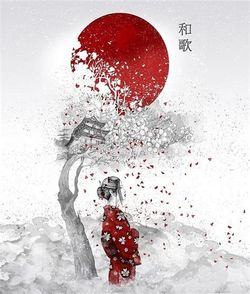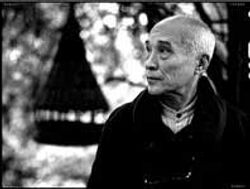Oct 7, 2023
🇯🇵 Japanese Poetry Reading - 01 🇯🇵

🇯🇵 Japanese Poetry Reading... waka 和歌.
The word waka means "Japanese poem," and it is a form so basic to Japanese literature that Japanese still study and write it today.
When we refer to poem in general, we say "shi(詩)," and the corresponding verb is "kaku(書く)" or "tsukuru(作る)." There is also a traditional type of poem called waka(和歌) or Japanese (traditional) verse, also known as tanka(短歌) or literally short verse. Waka/Tanka consists of 31 syllables.

🇯🇵 Japanese Poetry Reading waka "Ikiru"

生きる
谷川俊太郎
生きているということ
いま生きているということ
それはのどがかわくということ
木もれ陽がまぶしいということ
ふっと或るメロディを思い出すということ
くしゃみすること
あなたと手をつなぐこと
生きているということ
いま生きているということ
それはミニスカート
それはプラネタリウム
それはヨハン・シュトラウス
それはピカソ
それはアルプス
すべての美しいものに出会うということ
そして
かくされた悪を注意深くこばむこと
生きているということ
いま生きているということ
泣けるということ
笑えるということ
怒れるということ
自由ということ
生きているということ
いま生きているということ
いま遠くで犬が吠えるということ
いま地球が廻っているということ
いまどこかで産声があがるということ
いまどこかで兵士が傷つくということ
いまぶらんこがゆれているということ
いまいまが過ぎてゆくこと
生きているということ
いま生きているということ
鳥ははばたくということ
海はとどろくということ
かたつむりははうということ
人は愛するということ
あなたの手のぬくみ
いのちということ
Living
Shuntaro Tanikawa
To be alive, to
be alive, to be alive, to
have a dry throat, to to be dazzled by
the sunlight filtering through the trees, to to
suddenly remember a certain melody, to
to sneeze
, to to hold your hand
To be alive, to be alive, to
be alive, to be alive, to be alive, to be alive, to be alive, to be alive, to be alive, to to be alive, to to be alive, to to be alive, to to be alive, to to be alive, to to be alive, to to be alive, to to be alive, to to to be alive, to to to be alive, to to to be alive, to to to be alive, to to to be alive, to to to be alive, to to to be alive, to to to be alive, to to to be alive, to to to be alive, to to to be alive, to to to be alive, to to be
in the mini-skirt, to to be in
the planetarium,
to to be Johann Strauss, to to be Picasso,
to to to meet all that is beautiful, but to to guard against the hidden evils.
Being alive means
being alive,
being able to cry, being able
to laugh,
being angry,
being free.
That I'm alive,
that I'm alive right now, that there
's a dog barking in the distance, that
the earth is spinning right now, that there's a baby's
first cry somewhere right now, that somewhere right
now a soldier is getting hurt, that
the swing is shaking right now. The
present is passing
To be alive, to
be alive, to be alive, to
the birds to flap, to
the sea to roar, to
the snail to crawl, to
to love, to the warmth
of your hands, to life.
The poem titled "Ikiru" and it is written by Shuntaro Tanikawa, a renowned Japanese poet. Here's a summary of the poem:
The poem explores the concept of "living" or "being alive" and emphasizes the various experiences and sensations that come with it. It begins by stating that being alive means feeling thirsty, being dazzled by the sunlight filtering through the trees, suddenly recalling a melody, sneezing, and holding hands with someone.
The poem continues by expressing that being alive means encountering beautiful things such as a miniskirt, a planetarium, the music of Johann Strauss, the art of Picasso, and the magnificence of the Alps. It also highlights the importance of being attentive to hidden evils in the world.
Furthermore, the poem states that being alive means being able to cry, laugh, get angry, and experience freedom. It mentions that at this very moment, a dog is barking in the distance, the Earth is spinning, somewhere a baby is being born, a soldier is getting wounded, a swing is swaying, and time keeps passing by.
The poem concludes by highlighting that being alive means birds flapping their wings, the roaring of the sea, snails crawling, and people loving each other. It mentions the warmth of someone's hand and emphasizes that it is all about life itself.
Overall, "Ikiru" celebrates the various aspects of life and the depth of human experiences, from simple sensations to profound emotions and connections with others. It invites the reader to appreciate the beauty and preciousness of being alive.
Resources:
http://www.nanarokusha.com/ikiru_zenbun.htm
https://www2.proz.com/kudoz/english-to-japanese/poetry-literature/2969009-to-write-a-poem.html?phpv_redirected=1#:~:text=When%20we%20refer%20to%20poem,Tanka%20consists%20of%2031%20syllables.
https://wikilanguages.net/Japanese/poem.html#uses
https://www.plathey.net/livres/japon/shuntaro.html
By undefined
11 notes ・ 52 views
Japanese
Intermediate